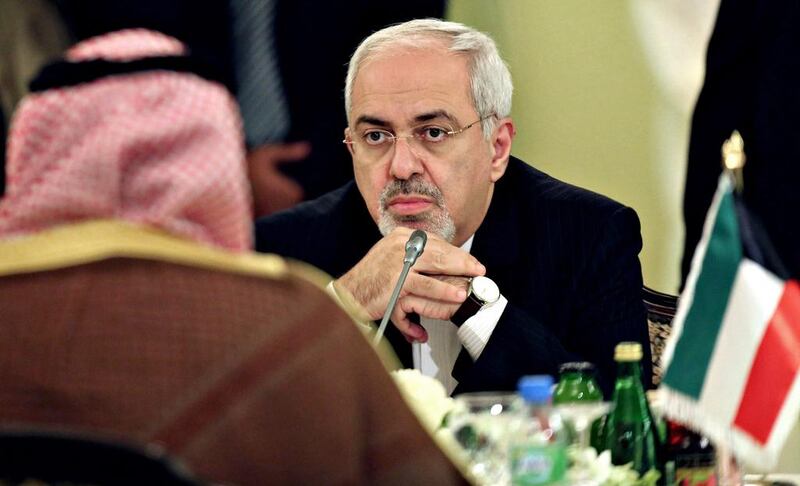KUWAIT CITY // Iran’s foreign minister assured Gulf Arab states yesterday his country’s nuclear deal with the West is in their interest and announced plans to visit Saudi Arabia.
Improving relations with Gulf countries is a central plank of Iran’s diplomatic policy under its new president, Hassan Rouhani.
Asked about three UAE islands occupied by Iran, the foreign minister, Mohammad Javad Zarif, said Tehran was ready to talk about one of the islands, Abu Musa.
Mr Zarif’s trip comes after the Islamic republic last Sunday struck a landmark deal in Geneva with Western powers on Iran’s disputed nuclear programme. While the accord was welcomed by Gulf countries, some, especially Saudi Arabia, expressed caution.
“The solution to this issue serves the interests of all countries in the region. It is not at the expense of any state in the region,” Mr Zarif said after meeting his Kuwaiti counterpart Sheikh Sabah Khaled Al Sabah.
“Be assured that the nuclear deal is in favour of the stability and security of the region.”
Mr Zarif said that Iran was looking to open a new page in relations with the Gulf. He also praised the outcome of a visit last week by Sheikh Abdullah bin Zayed, the UAE Foreign Minister, who became the first Gulf official to visit Tehran since the agreement was signed.
Mr Zarif is also visiting Oman during his current tour and confirmed plans to visit Saudi Arabia although no date has yet been set.
“We look at Saudi Arabia as an important and influential country in the region.”
The trip was Mr Zarif’s first official visit to a Gulf country was he was to travel to Oman after Kuwait.
Both world powers and Israel suspect Tehran’s nuclear ambitions include acquiring a nuclear weapon, a charge Iran vehemently denies.
Iran’s nuclear chief Ali Akbar Salehi said yesterday Tehran will never abandon the Arak heavy-water reactor, considering it a “red line” in talks with world powers.
“Your actions and words show you don’t want us to have the Arak heavy-water reactor which means you want to deprive us of our rights,” Mr Salehi said.
“But you should know that it is a red line which we will never cross, likewise enrichment” of uranium.
Arak is of concern because, in theory, it could provide Iran with plutonium, an alternative to highly enriched uranium used for a nuclear bomb.
Relations between the six Gulf Cooperation Council (GCC) nations and Tehran have also clashed over Iran’s support for Syria’s President Bashar Al Assad.
Mr Zarif said the Geneva deal does not satisfy all of Iran’s demands or “the goals of the other party, but it is important to implement it”.
“We will implement the deal and are convinced that implementing it will build the trust,” he said.
Mr Zarif said the “political option” is the only solution to the Syrian conflict and warned that the civil war could cause the spread of extremism and sectarianism in the region.
“We believe that Syria’s future should be determined by the Syrian people only through ballot boxes,” he said.
“There is no solution to the Syrian crisis except by a political settlement. The military solution is an illusion.”
Iran will attend the Geneva 2 peace conference on Syria “if invited” but will not accept preconditions, Mr Zarif said.
* Agence France-Presse with additional reporting by Reuters





